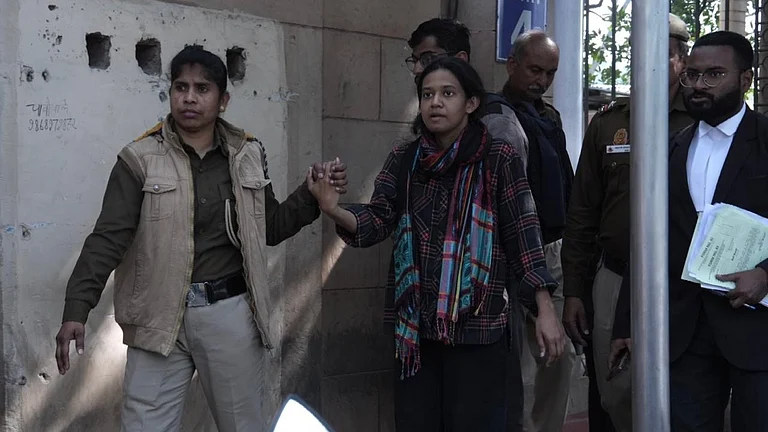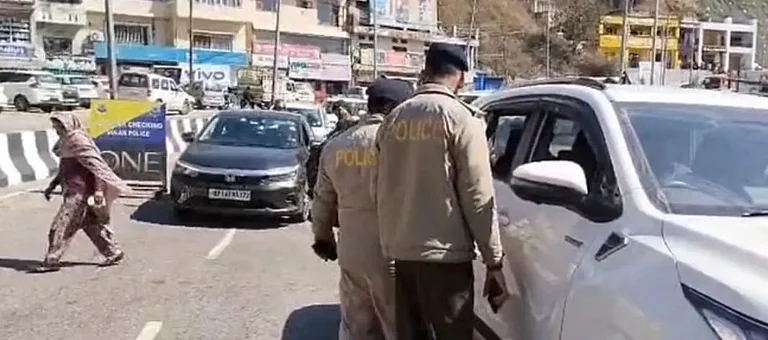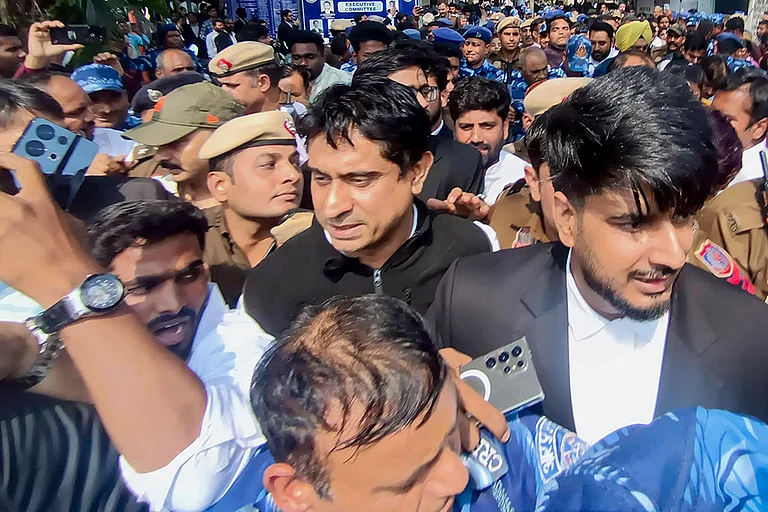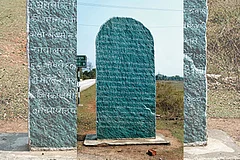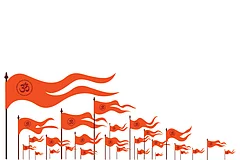“They were using tear gas to disperse us. It made our eyes burn...That’s when some of them (the police) started firing pellets at us,” says Bikram Jeet Singh, 31, who was on the frontline of the farmers’ protest at Shambhu border at the Punjab-Haryana border on February 14. About 20-25 police personnel had toppled their barricades and rushed towards the farmers with their guns. “The pellets looked like small bombs. The flesh (on my arms) fell off completely,” says Singh who was hit on his arms and was admitted to a nearby hospital. Jaskarn Singh, 29, suffered a one-inch rubber bullet injury on his left leg. “It hurts a lot…We are farmers, we should not have been attacked this way,” he says. His friend, Ravinder Singh, was also injured. “A tear gas shell fell on my foot and burst open. It made my foot swell up,” he says, pointing at his toenails that are about to come apart.
Shambhu, the crossing point near Ambala on National Highway-1, became the latest flashpoint of the farmers’ protest last week. More than 200 people were injured on February 13 and 14 when the police used tear gas shells, pellet guns and water cannons on the protesting farmers. Tens of thousands of farmers started their march from Punjab to Delhi but were stopped from entering Haryana through the Shambhu and Khanauri points. As they tried to get closer to breach the multi-layered barricading, thick clouds of smoke enveloped the area. Drones flew over the crowd, dropping tear gas shells on them. “The police told the media that we pelted stones at them and that’s why they retaliated. But the truth is they had laid down stones on the ground. When they used tear gas on us, some people picked up those stones and threw them at the police,” says Bikram Jeet.
While Delhi was turned into a fortress overnight on February 13; concrete blocks, sandbags, iron spikes, trenches and anti-riot vehicles were placed as part of the security arrangements made at various border points between Punjab and Haryana to prevent farmers from marching toward Delhi. Hundreds of security personnel were deployed as well.

The latest round of agitation harkens back to the farmers’ protest of 2020-21 when thousands of farmers under the undivided Samyukta Kisan Morcha (SKM) camped at Delhi’s Singhu, Tikri and Ghazipur borders for about a year. Dozens of farmers are said to have died during the protest. The bone of contention was three farm laws. After almost a year of protests, the Centre was compelled to repeal these. But the farmers’ demand of a legal guarantee for the procurement of all crops at the minimum support price (MSP), among other assurances, remain unfulfilled.
“We hope the government will listen to our demands and implement MSP as per the Swaminathan Commission report for all crops. And we also want farm debt waiver. When the loans of big corporates are being waived off, why not ours?” says Paramjit Singh, a farmers’ leader at Shambhu. He adds, “We do not want private companies to buy our crops. They purchase the crops from us at a nominal price but sell it to big vendors at inflated rates based on market fluctuation.”
Many farmers say they wanted to protest peacefully but were not allowed to. The Haryana government has also suspended mobile, internet and bulk SMS services in several districts to prevent rumours from spreading. Several videos and posts from the protest site have been taken down on social media.

The farmers camped at the Shambhu border over the last week are determined to march ahead for their rights. Thousands have gathered at the site, turning tractors into makeshift tents on the 5-6 km stretch, and cooking their food on open fires. They chant slogans in unison, as they wait for news from their leaders who are slated to meet the Central government. There is anger as protesting voices ring out in the air, but there is also a steely resolve to wait it out.
The Dilli Chalo march is being spearheaded by the SKM, a non-political group, backed by 100 unions, and the Kisan Mazdoor Morcha (KMM), in allegiance with around 150 unions. KMM, which split from the SKM in July 2022, is coordinated by Jagjit Singh Dallewal, president of the Punjab-based Bharatiya Kisan Union (BKU), Sidhupur. The KMM is also backed by the Kisan Mazdoor Sangharsh Committee (KMSC) that did not directly participate in the 2020-21 protest.
“We also want farm debt waiver. When the loans of big corporates are being waived off, why not ours?”
The protests, although coordinated from Punjab, have gained support transcending state boundaries. On February 16, several other farmer organisations and trade unions called a nationwide strike to protest against the violence and injustice farmers and labourers had to suffer.

“The farmers protesting at Shambhu are our brothers and sisters...We don’t want to create a disturbance. But if you (the government) use guns, we will revolt,” Prem Singh Gehlawat of the All India Kisan Mahasabha (AIKM) told Outlook, ahead of the Gramin Bharat Bandh during which farmers blocked several roads and railway tracks. At Jantar Mantar in New Delhi, 10 central trade unions staged a demonstration. Speaking at the venue, Amarjeet Kaur, national secretary of the All India Trade Union Council (AITUC), said, “The government is hell-bent on oppressing farmers and labourers...The way they laid down iron nails and treated the farmers was as if they (farmers) were terrorists infiltrating from across the border."
The Bharat Bandh was spearheaded by the Samyukta Kisan Morcha (SKM) to press the government to accept farmers’ demands, including a legal guarantee of MSP. The strike was joined by students, agricultural workers, teachers, small traders, and transport operators, among others.
Some of the most prominent names of the previous farmers’ agitation like Balbir Singh Rajewal, Joginder Singh Ugrahan and Gurnam Singh Charuni have, however, been missing from the protest so far. In November 2020, the farmers had formed a united banner of the SKM to protest against the farm laws. However, on the heels of Assembly elections in 2022, disagreements erupted as some leaders wanted to contest elections, while others wanted to stay politically neutral. This caused multiple splinters. However, with the clamour growing around farmers’ demands, the group said that they would be intensifying their protest.
Besides the legal guarantee of MSP, the farmers’ demands include pension for farmers and farm labourers, farm debt waiver, subsidy in electricity tariff, withdrawal of police cases and “justice” for those killed in Lakhimpur Kheri violence, reinstatement of the Land Acquisition Act, 2013, and compensation to the families of the farmers who died during the previous agitation. Farmer leaders from Punjab met Union ministers Arjun Munda, Piyush Goyal and Nityanand Rai on February 8, 12, 15 and 17, but the meetings were inconclusive. In the meeting on February 17, the government proposed buying of pulses, maize and cotton crops by government agencies at minimum support prices for five years after entering into an agreement with farmers. The farmer groups however rejected the government proposal, saying it seeks to "divert and dilute" the farmers' demand for MSP. They will now resume their march to Delhi from February 21.
MORE FROM THIS ISSUE
“Protesting has become second nature to us,” says 70-year-old Ravinder Kaur, who was at the Singhu border during the previous farmers’ protest. “These governments have made it our habit to lay down daris on the road and cry for our demands.”
(This appeared in the print as 'Resistance Redux')



